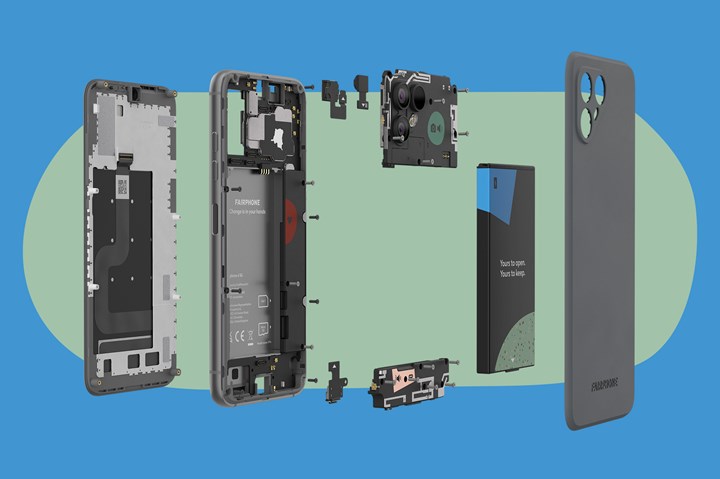Covestro’s recycled thermoplastic resins support circular economy for electronics
Cooperation with smartphone manufacturer, Fairphone, includes use of partly and fully recycled TPU and polycarbonate resins, including glass fiber-reinforced grades.

The Fairphone 4, with a glass fiber-reinforced center frame. Photo Credit: Fairphone
Covestro (Leverkusen, Germany) is collaborating with Fairphone (Amsterdam, Netherlands) on the use of circular material solutions for the Dutch social enterprise’s smartphones. Fully and partly recycled thermoplastic polyurethanes (TPU), are used in the protective case of the Fairphone 3 and its successor, the Fairphone 4, as well as glass fiber-reinforced grades for the smartphone frames. Partly recycled polycarbonate resins are additionally used in the newer device.
Products from Covestro's post-consumer recycled (PCR) polycarbonate portfolio, Makrolon, are used in the Fairphone 4’s rear device cover, middle frame and wireless charger. With a PCR content of 30-50%, Covestro says this portfolio has physical properties comparable to virgin material and offers good impact strength, balanced flow behavior, high stiffness and flame retardancy to ensure a long service life, while also reducing CO₂ emissions by 30% compared to virgin material.
Covestro has also developed a new range of recycled and partially recycled TPUs under the Desmopan brand, which are now used in the protective cover of the Fairphone 4 and are certified according to RCS (Recycled Claim Standard), an international standard for the traceability of recycled raw materials within supply chains.
This includes the product, Desmopan 3095AU RC100, which was developed after identifying several streams of post-industrial recycled plastics. The fully recycled material exhibits the typical advantages of TPU — for example, high chemical and abrasion resistance, but easier processability because it melts at lower temperatures and flows better than virgin material. The product has proven itself when used in the protective case of the Fairphone 3 and is now being used in the Fairphone 4. It is available in three color variants: gray, green and pink.
Fairphone devices are known for their modular design, which favors better repairability. Such a design requires materials with robust mechanical properties to enable repeated disassembly and repair. The glass fiber-reinforced grade of the Makrolon PCR portfolio are said to offer a good solution for the heavily stressed center frame of the Fairphone 4, and the increased stiffness and impact resistance are in line with Fairphone’s modular design approach. Thus, Covestro also supports a mono-material approach in each case for the use of polycarbonates in the housing and TPU plastics in the protective cover to facilitate recycling of the smartphones at end of life (EOL).
“With the help of our PCR portfolio, we support Fairphone in achieving its sustainability goals. This includes particularly robust material solutions that enable a modular design of Fairphone products and promote their repairability,” says Nan Hu, VP head of global industrial marketing, electronics and electrical, in the Engineering Plastics business entity at Covestro. “Such projects and collaborations are in line with our vision to become fully circular.”
“This is just a first step, and we will continue to support Covestro in developing more sustainable materials,” concludes Wayne Huang, VP product operations at Fairphone.
Related Content
-
The AAMMC Tech Hub: Ramping U.S. production of large thermoplastic composite aerostructures
CW talks with Syensqo, Spirit AeroSystems and other consortia members about current funding, specification of the next world’s largest press, organizational structure and projects to support U.S. companies in the race to deliver >40,000 sustainable and efficient aircraft over the next 20 years.
-
Update: THOR project for industrialized, recyclable thermoplastic composite tanks for hydrogen storage
A look into the tape/liner materials, LATW/recycling processes, design software and new equipment toward commercialization of Type 4.5 tanks.
-
Plant tour: Sekisui Aerospace, Orange City, Iowa, Renton and Sumner, Wash., U.S.
Veteran composites sites use kaizen and innovation culture to expand thermoplastic serial production, 4.0 digitization and new technology for diversified new markets.
















